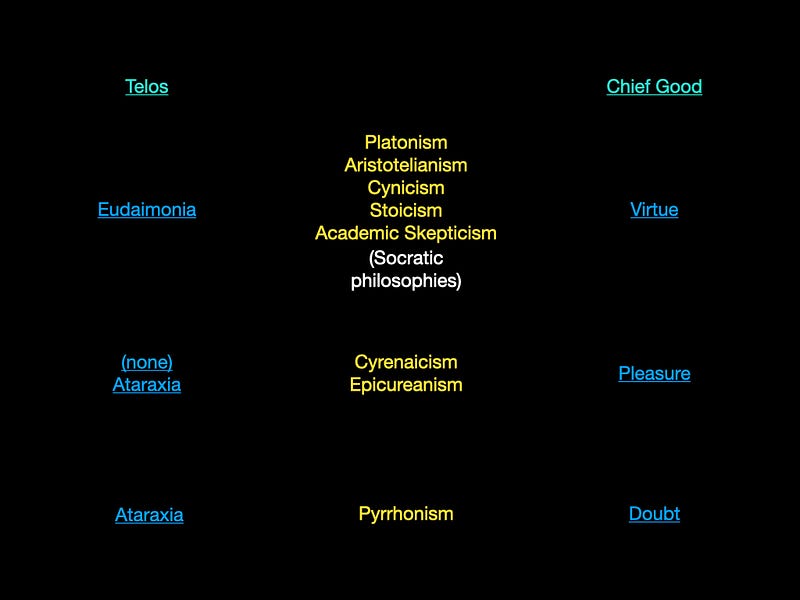# Understanding Hellenistic Philosophies: A Comprehensive Overview
Written on
Chapter 1: The Hellenistic Era and Its Philosophies
The Hellenistic period, which began with the death of Alexander the Great in 323 BCE and concluded with the Battle of Actium in 31 BCE, marked a significant era in human history. This period led to the rise of various philosophical schools that not only shaped Western civilization but continue to hold relevance today.

In total, eight principal schools of thought emerged during this time, each with distinct perspectives on ethics and the ultimate good. These schools include Academic Skepticism, Aristotelianism, Cynicism, Cyrenaicism, Epicureanism, Platonism, Pyrrhonism, and Stoicism. Given the breadth of these philosophies, understanding their unique principles can be challenging. This guide aims to clarify the foundational ideas of each philosophy, particularly in terms of ethical living.
Section 1.1: Overview of Ethical Philosophies
Let’s explore a brief outline of the ethical principles espoused by each school, focusing on how they define the good life.
- Academic Skepticism: This school is rooted in Platonism, associated with figures like Carneades and Cicero. Skeptics emphasize that virtue leads to eudaimonia, or a fulfilling life, advocating for a provisional stance on opinions based on evidence.
- Aristotelianism: Known for its practical approach, Aristotelianism asserts that while virtue is essential for eudaimonia, it is not sufficient without external goods like health and wealth.
- Cynicism: This radical philosophy, although primarily practical, promotes the idea that virtue is the only true good. Cynics often rejected societal norms and material possessions, emphasizing a life of simplicity and authenticity.
- Cyrenaicism: Founded by Aristippus, this school advocates for pleasure as the primary aim of life. The Cyrenaics focus on immediate physical pleasures, suggesting that one should engage in these experiences with temperance.
- Epicureanism: Often misunderstood as purely hedonistic, Epicurus taught that the absence of pain (ataraxia) is the ultimate good. He advocated for a simple life, valuing friendship and tranquility over social engagement.
- Platonism: This philosophy centers on the Idea of the Good. Platonists believe that understanding the Good leads to harmony within the soul, balancing reason, spirit, and appetite.
- Pyrrhonism: An earlier form of skepticism, Pyrrhonists, led by figures like Pyrrho and Sextus Empiricus, also seek ataraxia but through the suspension of judgment on non-evident matters.
- Stoicism: Founded by Zeno of Citium, Stoicism posits that virtue is necessary and sufficient for a flourishing life. Stoics aim for apatheia, a state free from disturbances caused by passions.
Now that we have an overview of these philosophies, it becomes clear that many share common threads, particularly those influenced by Socratic thought. Five of the schools—Academic Skepticism, Aristotelianism, Cynicism, Platonism, and Stoicism—evolved from Socratic ideas, while Epicureanism and Cyrenaicism diverge significantly by challenging the focus on virtue.
The first video, "What is Hellenistic Philosophy?" features Michael Tremblay and Simon Drew discussing the fundamental aspects of Hellenistic thought, providing a deeper understanding of its significance in the philosophical landscape.
Section 1.2: Comparative Analysis of Philosophies
Exploring the philosophies by their goals (telos) reveals that Socratic schools pursue eudaimonia, while Epicureanism and Pyrrhonism seek ataraxia, with Cyrenaicism rejecting the notion of a singular goal altogether.
Regarding the chief good, Socratic philosophies advocate for virtue, whereas the hedonistic schools prioritize pleasure. Pyrrhonism, unique in its approach, emphasizes doubt through the suspension of judgment.
Chapter 2: Evaluating the Philosophical Landscape
This analysis prompts two critical questions: (1) Is there one philosophy that stands out as superior for leading a fulfilling life? (2) Should one adopt an eclectic approach, drawing from multiple philosophies?
In my view, Socratic philosophies hold a significant advantage due to their focus on virtue as a pathway to excellence and harmony within the broader human community. This perspective fosters a more meaningful existence compared to the pursuit of mere tranquility or pleasure.
The second video, "3. Hellenistic Philosophies (History of European Philosophy)," delves into the historical context and impact of these philosophies, enriching our understanding of their relevance today.
While Cicero acknowledged the similarities among Hellenistic philosophies, he also expressed a cautious eclecticism, appreciating various schools while maintaining a preference for the New Academic approach. This suggests that one can indeed benefit from integrating insights from different philosophies, striking a balance between pleasure and engagement in social and political life.
In my ongoing book projects, I aim to explore the eight philosophies in detail, alongside the Socratic tradition, illustrating how each offers valuable lessons. Additionally, I will examine the intersection of ethical skepticism and modern scientific skepticism, highlighting the importance of discerning truth in contemporary discourse.
As Cicero astutely noted, "To hasten to give assent to something erroneous is shameful in all things," a reminder of the necessity for rigorous critical thinking in our pursuit of knowledge and ethical living.